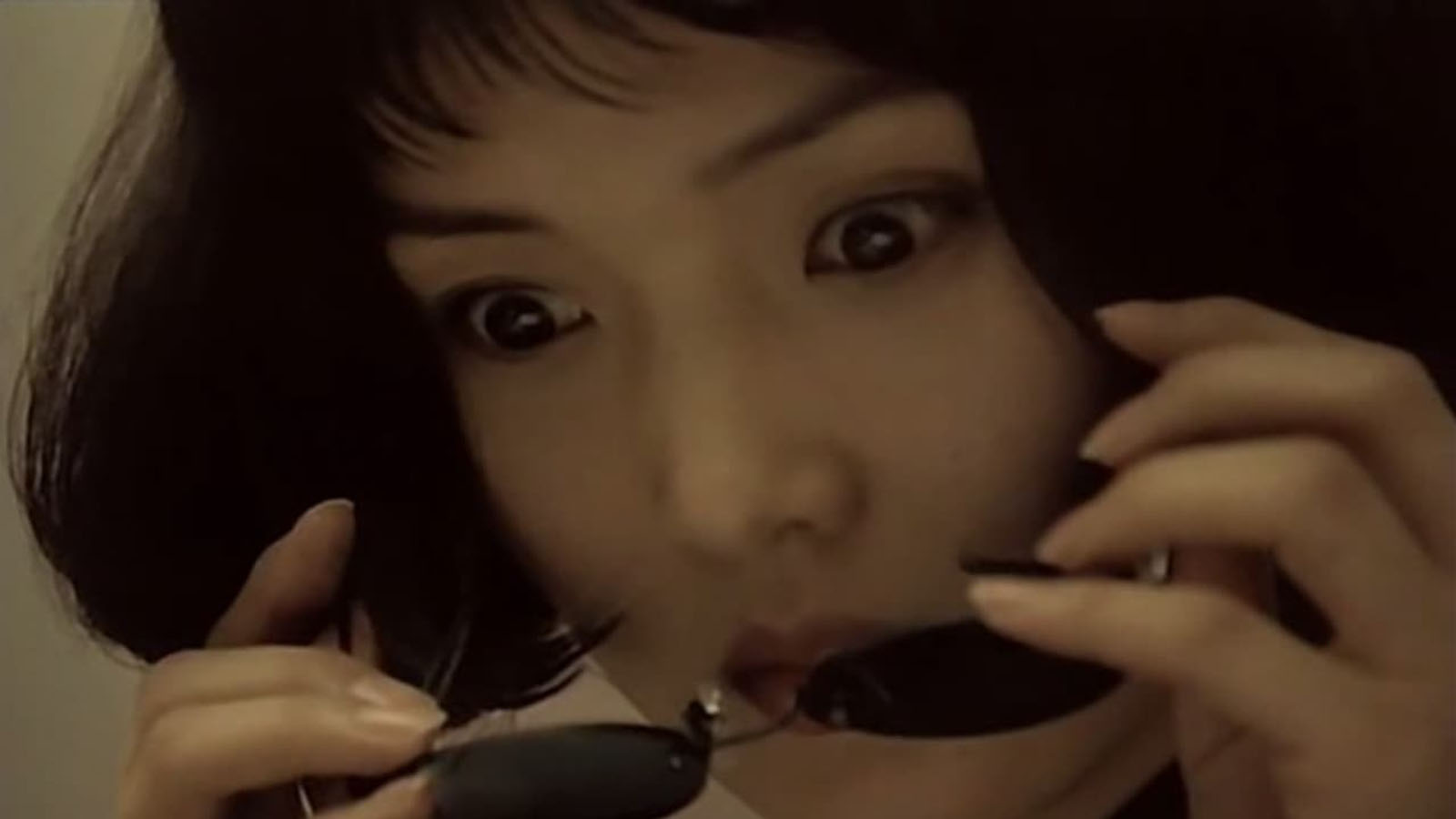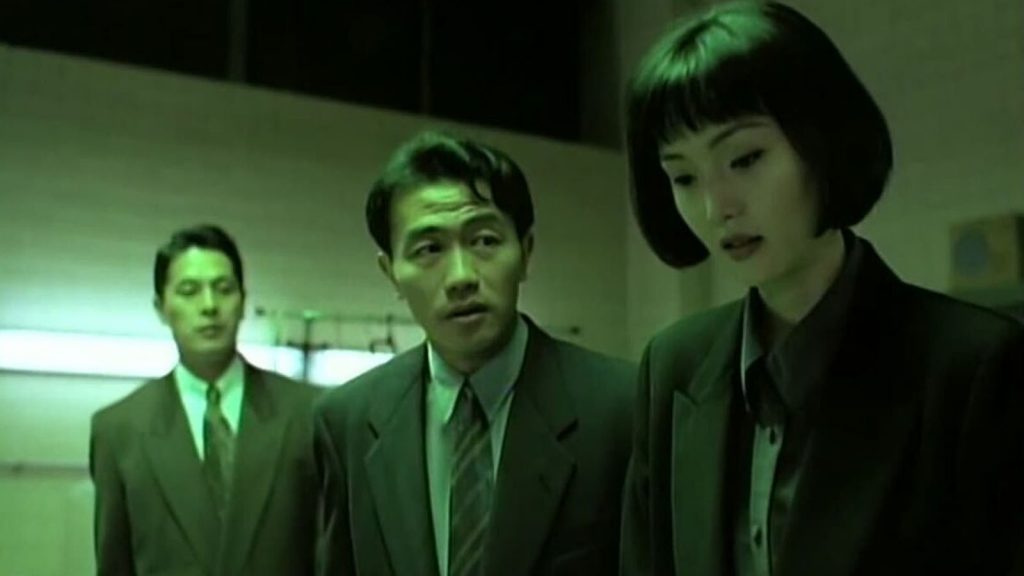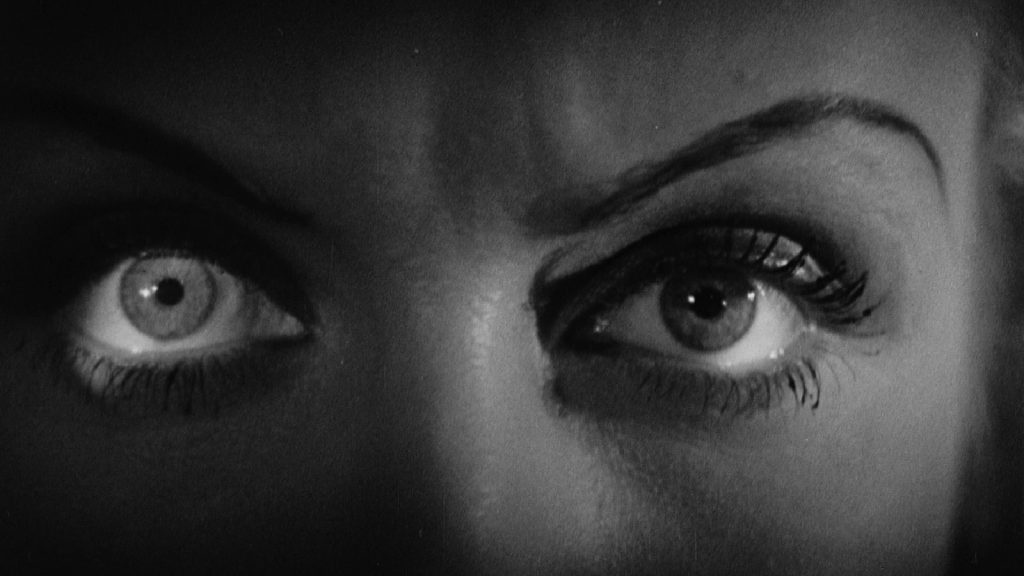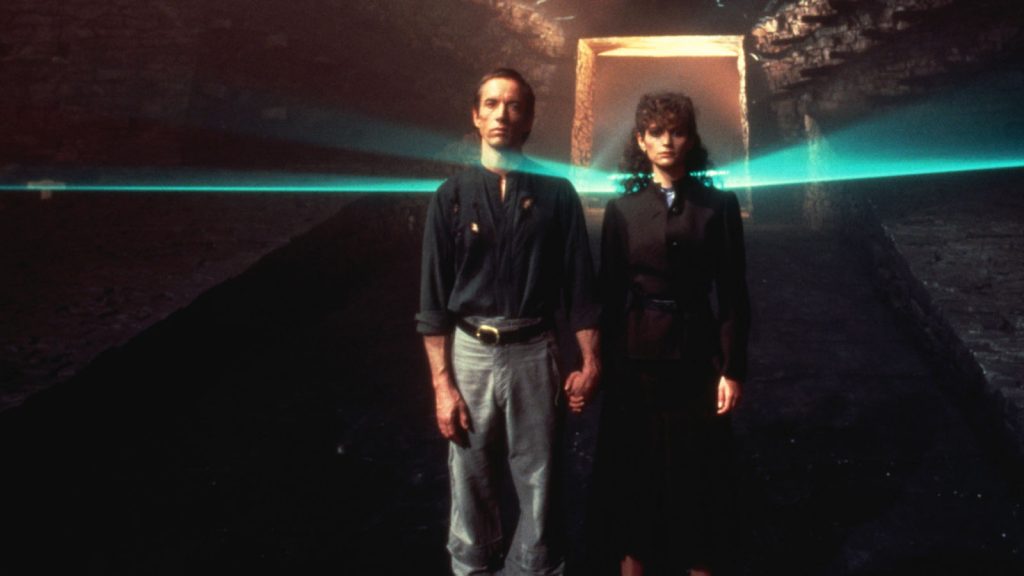
Angel Dust (1994) is an energetically bleak film about the terrific ease with which we surrender our minds. Anyone who has been on the Yamanote loop service in Tokyo at 6 p.m. on a Monday knows something about silent surrender—the trapped bodies, the briefcase in the ribs, the downcast eyes. We open here on a packed train car and on the first in a series of murders, as a young former cult member, pricked by an unseen syringe, slips quietly dead to the floor. This was Japanese director Gakuryu (then known as Sogo) Ishii’s first feature film in 10 years, a tack away from the frenetic satire of The Crazy Family (1984) and the punky disorder of Burst City (1982) toward a more restrained yet still bracing style that makes room for silence, all the better to draw us into the mysterious interior lives of his characters. The result is a glittery police procedural where the real twists are in the mind of Setsuko Suma (Kaho Minami), a criminal psychologist who dreams about Mount Fuji—not about climbing to its summit, but about sinking into its tortuous guts.
Suma, icily ’90s in her black suits and Anna Karina bob haircut, is an expert profiler in the Manhunter mode. One long look into the eyes of a slain victim and she twigs the killer’s motivation. She bullies her colleagues with questions right out of Philip K. Dick’s Voigt-Kampff test (used to detect androids in Blade Runner): “If you come across a wounded camel in the desert begging you to kill him, what do you do?” Her partner’s evasive response, one of the few laughs in the film, sets up the idea that every question is really a stab at domination, a bid for control of the answerer’s mind. Take that old chestnut posed by anxious partners, wellness goons, and advertisers everywhere: “Are you happy?” This question—expressed in Japanese words whose literal meaning is “Are you at the summit?”—is asked at the train station by a simpering recruiter for the Ultimate Truth Church, and it shadows Suma’s journey, threatening to upend her marriage and sanity as she looks for the killer. The real test is prime suspect Rei Aku (Takeshi Wakamatsu), a former lover and pioneer of “reverse brainwashing,” a controversial technique for deprogramming cult members like the first victim on the train. In a series of unnerving interviews, he starts prying his way into Suma’s brain.
“Reverse brainwashing” turns out to look a lot like good old-fashioned brainwashing. In one disturbing scene shot on grainy black-and-white video—a few years before Ringu taught us that the format was fatal—Aku stands over a bound, drugged-up member of the Ultimate Truth Church and taunts her: “Convert me.” Like any decent debate bro, he finds a confused extremist to flex his preconceived rationalist notions on. His is a nihilistic vision that he tries to force on Suma, dressing up his desire to get back into her pants with fancy talk about Nietzsche and John Donne. As the film gets weirder and weirder, we are slowly subsumed along with the detective into the malignant consciousness of Aku. Keep an eye on the fingers of his right hand—tap, tap; tap, tap—and see if your thoughts don’t begin to throb along.
In one gorgeous shot after another, Ishii proves that cinematic style is the ultimate mind control. As Kiyoshi Kurosawa does in his masterpiece Cure, released in Japan three years later, Ishii feathers the matter of mind control into the hypnotic surfaces of his film. It’s in the visual patterns: clean geometric shapes everywhere, especially triangles—the cult’s enigmatic sign, the Olympus brand icon hanging from a building, and Mount Fuji, though of course it has “a chip missing” like the almost-full moon Suma points out in the beginning (hinting that she may be missing a chip herself). It’s in the sound design: throbbing industrial pulses, drones revving up and down, and snaky bass lines. It’s in the performances, too: there are long, blank pauses as actors deliver lines like hypnotized graduates from Werner Herzog’s Heart of Glass Academy of Acting. The film ends with a beguiling trio of graphic match cuts—silent, triangular compositions involving a mountain, a man, and a doomed couple. By then you won’t care who the killer is, and you’ll only half want to free your mind from Ishii’s beautiful traps.

a writer living outside Philadelphia, is currently working on a horror project set in western Pennsylvania. He co-wrote the movie Anamorph, starring Willem Dafoe.
Not just a key figure in the emergence of the J-horror movement, Kiyoshi Kurosawa is also a contender for the most important filmmaker in all of Japanese horror history. While it may have been Pulse, with its eerie play on the...
BY LAURA KERN | July 15, 2022
Consider the Dies Irae. Eight dire notes to remind you that you are going to die. This musical phrase from a 13th-century plainchant about Judgment Day booms...
BY TOM PHELAN | July 26, 2024
Pulse is, in my mind, the pinnacle of the J-horror wave in the late ’90s and early ’00s. It is part of Kiyoshi Kurosawa’s early explorations into the apocalypse, which also include Cure (1997) and the criminally underseen Charisma (1999).
BY RUFUS DE RHAM | November 3, 2025

This pre-Code offering packs a lot of story into its typically brisk running time, with several plot threads weaving together a (not always successful) tapestry of spooky and criminal doings.
READ MORE >
BY ANN OLSSON | Month 00, 2021

In what could be the fastest-resulting rape revenge movie, a drunken lout brutally forces himself on Ida, the young woman who doesn't return his affections, during a party over Labor Day.
READ MORE >
BY LAURA KERN | Month 00, 2021

Beast is a lot of movies in one package - fractured fairy tale, belated-coming-of-age story, psychological drama, regional horror film - but above all it's a calling card for its leading lady, Jessie Buckley.
READ MORE >
BY LAURA KERN | Month 00, 2021